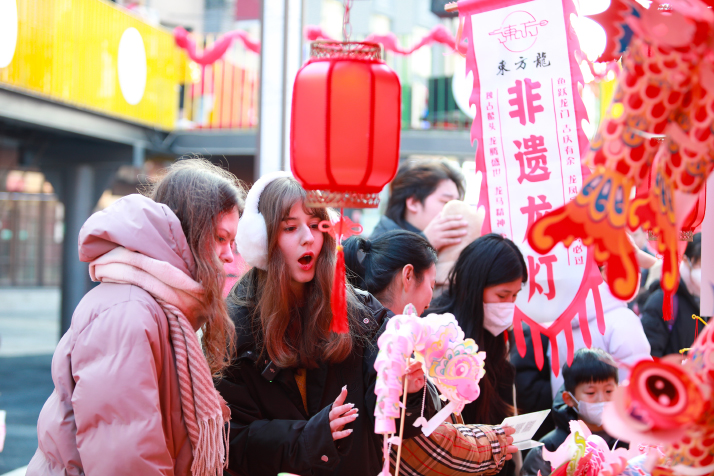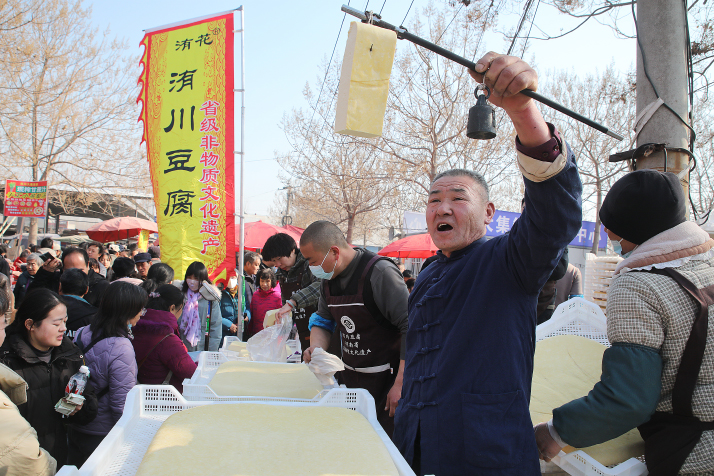| China |
| Chinese consumers splurge on festival necessities | |
|
|
 International visitors shop for decorations at a county fair in Weihai, Shandong Province, on January 19 (XINHUA)
A children's folk rhyme describing people's behavior during the Spring Festival, China's most important annual holiday which fell on January 29 this year, goes: "They buy meat, sugar, nuts and staple foods, as well as clean the house..." This ancient song is a testimony to the preparations people make to celebrate the Spring Festival, or Chinese New Year. In modern China, people have kept the habit of making big purchases in the lead-up to this time of family reunion and sumptuous meals, and the things they like to buy have become more diverse. "Recently, top-selling goods include snack packs, alcohol, pastries, nuts and fresh fruits and vegetables, as well as indoor decorations," a customer manager surnamed Wang from Wu Mart, a well-known supermarket chain in north China, told Beijing Review. This year's Spring Festival holiday, which runs from January 28 to February 4, is the beginning of the Year of the Snake. The Chinese Zodiac consists of 12 animals: the Rat, Ox, Tiger, Rabbit, Dragon, Snake, Horse, Sheep (or Goat), Monkey, Rooster, Dog and Pig. Each animal represents a year in a 12-year cycle, and people's birth years are associated with these animals. "Given 2025 brings the Year of the Snake, many customers have a particular preference for fish and shrimp, which can take a snake-like texture when cooked. We have adjusted our logistics resources to provide customers with the freshest products available. Moreover, as customers are usually in a hurry this time of year, with a long list of things to buy, we have reorganized our shelves to create a one-stop area for all kinds of festival necessities, which allows them to wrap it all up in 20 minutes," Wang added. Surging fields The shopping craze taking over supermarkets nationwide around this time of year is driven by people's desire to stock up on supplies for the most important holiday dinner—nianyefan. Nianyefan, meaning "dinner on New Year's Eve"—on January 28 this year, typically features more than 10 dishes. "I like to be prepared well in advance and we enjoy having a completely stocked fridge—in Chinese culture, this suggests next year will see a good harvest," a Beijing resident surnamed Feng, who was pushing her packed kart through the Wu Mart outlet, told Beijing Review. But for those who may not be as confident at the stove, or just don't feel like cooking, dining out is a good option. "We were fully booked on [Chinese] New Year's Eve," Zhao Xiaohui, manager of a restaurant in Langfang, Hebei Province, told Beijing Review. "The private dining rooms, which can accommodate six to 10 diners, had all been snapped up as of late last December." Zhao added that, every year, the restaurant offers its patrons nianyefan packages, with prices ranging from 800 to 3,000 yuan ($108-408), featuring eight to 18 different dishes. "Customers are more than willing to spend some serious cash on the last dinner of the [lunisolar] year. It's a great way to wrap up the past year and wish for good luck in the coming 12 months. In addition to classic dishes from the northern regions, we also prepare courses from the southern regions, including those from Guangdong, Sichuan and Hunan provinces. This especially caters to those unable to go back to their hometowns for the holiday. All the courses use fresh ingredients and bear auspicious names," Zhao said. The China Cuisine Association projected in early January that during the Spring Festival 2025 holiday, total revenue of nianyefan and other feasts would reach 750 billion yuan ($102.1billion), a year-on-year increase of 10.2 percent. Emerging forms of food and beverage services, including takeout orders via e-commerce platforms, pre-cooked dishes and doorstep catering services were estimated to take up a larger share of this growth. Some restaurants have introduced nianyefan gift boxes containing pre-cooked or semi-cooked dishes. Beijing resident Jiang Rong ordered five such boxes at a restaurant in Beijing's Chaoyang District. "My husband and I are working extra shifts this New Year's Eve and don't have time to prepare every nianyefan dish from scratch, nor are we good at cooking. So we bought some ready-made dishes to share with our parents. Most dishes in the box are essential to have on the nianyefan table but are too difficult to make for kitchen rookies," Jiang told Beijing Review. Some local governments have issued discount policies to boost festival consumption. Henan Province, for instance, issued 200 million yuan ($27.3 million) in Spring Festival consumption vouchers, targeting consumers in key sectors such as retail, food and beverage, cultural tourism, and accommodation. On January 6, Wuhan, capital of Hubei Province, kicked off its 2025 Spring Festival Consumption Season, featuring over 300 activities promoting consumption. "We provide discounts for people's essential consumption during the Spring Festival holiday, including up to 30-percent off vouchers on retail goods, coupons of over 10,000 yuan ($1,364) for some domestically manufactured vehicles priced over 200,000 yuan ($27,287), and 10-percent discounts on cosmetics and other beauty products and services," an official from the Wuhan Municipal Bureau of Commerce said at the opening ceremony on January 6.  A salesman promotes beancurd at a county fair in Zhengzhou, Henan Province, on January 18 (XINHUA)
Rich connotations This year's Spring Festival has been a hot topic among Chinese netizens, who, all in all, have oozed more enthusiasm for consumption than ever because of the festival's recent recognition as a form of world intangible cultural heritage. On December 4, 2024, the traditional Chinese festival was added to the United Nations Educational, Scientific and Cultural Organization (UNESCO) List of Intangible Cultural Heritage of Humanity. Consequently, many Chinese believe this year's edition bears special significance and deserves more attention and a grander celebration. "I'm so thrilled about it. I think it represents the international community's recognition of our beloved traditional holiday," 33-year-old Beijing resident Li Mingxi told Beijing Review. "I grew up enjoying the festival's celebrations and now I will make an effort to create a wonderful holiday experience for my child—just like my parents did for me." In honor of the Year of the Snake, except for making regular purchases like food and clothes, Li got herself a manicure featuring snake designs and bought a set of gold, snake-shaped bracelets for her daughter and parents. "Both of my parents were born in the Year of the Snake and it is believed that giving people gold gifts of their zodiac during the Spring Festival will grant them good luck and protection," Li explained. "As an icon in traditional Chinese culture, the snake symbolizes wisdom, wealth and prosperity. Therefore, launching snake-zodiac gold jewelry during the Spring Festival not only aligns with consumers' traditional beliefs but also fulfills their aspirations for a better life," a salesperson at Chow Tai Fook, a renowned jewelry brand in China, told newspaper 21st Century Business Herald. Aside from buying accessories, people also find other ways to give themselves a fresh look to ring in the New Year. This includes getting a haircut, shopping for a new outfit and having their makeup done for the big annual dinner. On popular Chinese lifestyle and e-commerce platform Xiaohongshu, posts under the hashtag "my New Year's look" had raked in millions of views as of January 21. "My customers want to get a new hairstyle before the Spring Festival, whether it's dyeing, cutting or curling, because they believe this signifies 'starting anew,' meaning they can bid farewell to the past and 'start with a fresh head' in the New Year. I think our traditional beliefs, like this one, play an essential part in the consumption behaviors during the festival," Xu Bin, a hairstylist in Chaoyang, told Beijing Review. BR (Print Edition Title: Spring Splash) Copyedited by Elsbeth van Paridon Comments to zhangyage@cicgamericas.com |
|
||||||||||||||||||||||||||||||
|
